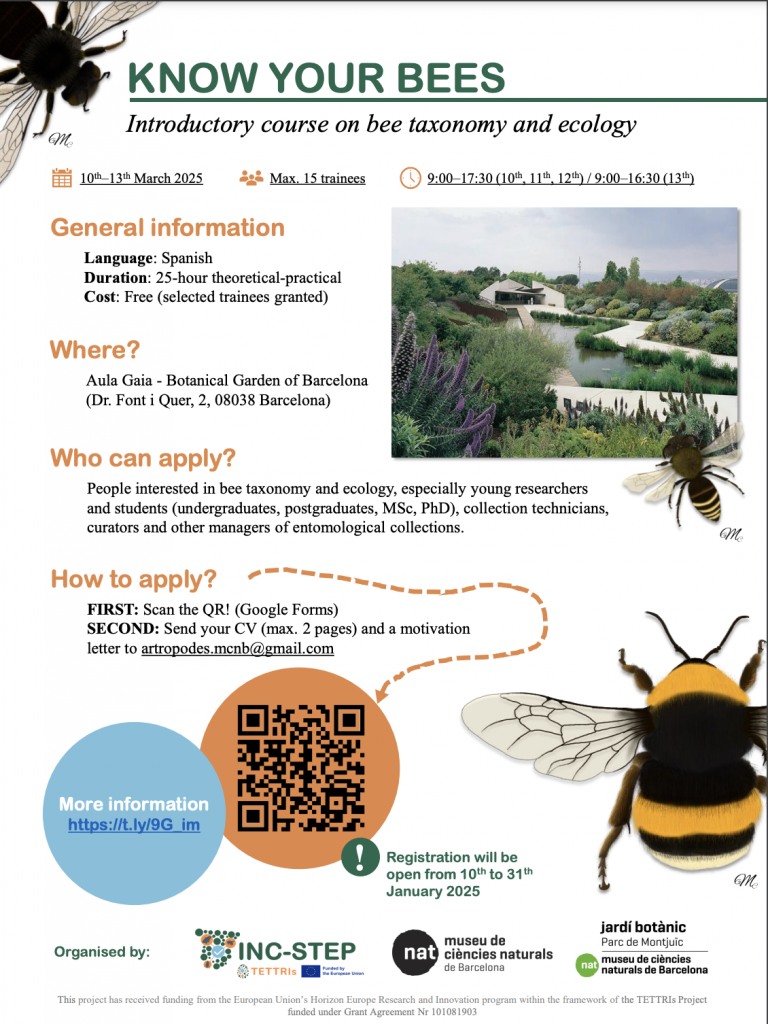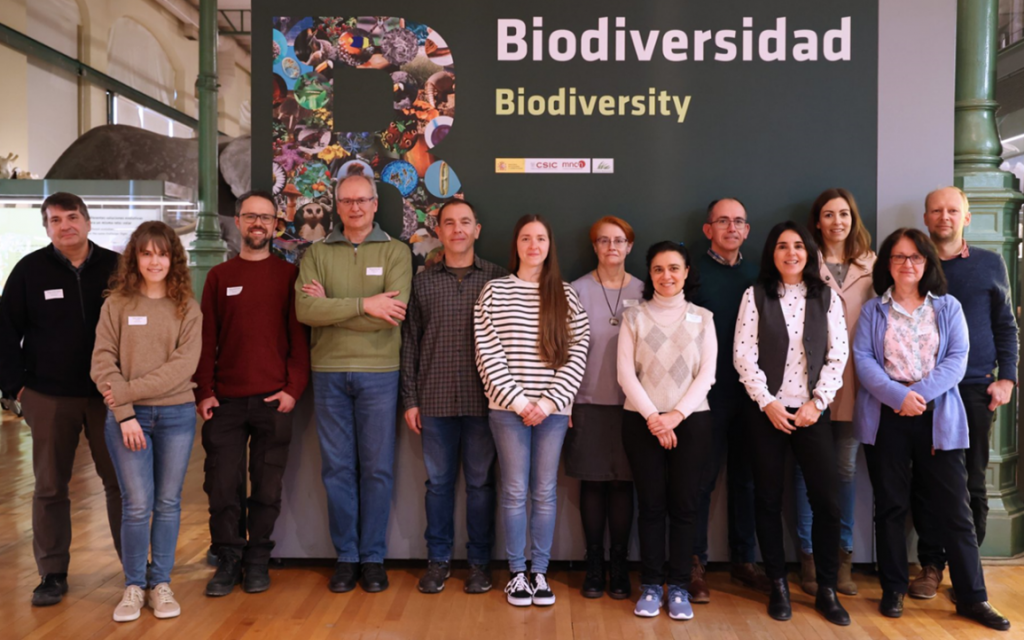Launched in January 2024, INC-STEP is one of 12 projects funded by TETTRIs, all aimed at co-creating solutions that drive transformative change in taxonomy. With over €199,000 in funding, INC-STEP aims to contribute to the identification and conservation of important threatened pollinator species. The project is creating a national reference collection for six groups of pollinator species, leveraging the thousands of insect specimens available in Spain’s scientific collections.

Protecting pollinators – the role of reference collections
Pollinators like bees, butterflies, and hoverflies are essential to human well-being. These insects help fertilize plants, making it possible for us to enjoy many fruits, vegetables as well as the beauty of natural landscapes. Without them, our ecosystems and agriculture would suffer greatly.
Protecting and preserving pollinators requires that we first understand them, and for that it is crucial that we can identify and document the wide variety of species that exists. However, many pollinators are difficult to identify, and there’s often a lack of accessible reference materials. This makes it harder for monitoring programs and citizen scientists to contribute to the conservation of important pollinators.
To tackle this, INC-STEP is building a national reference collection for six groups of pollinators, leveraging the thousands of insect specimens available in Spain’s scientific collections.
The INC-STEP project
One of the most important tools for identifying species are reference collections. These are curated sets of specimens, such as preserved insects, plants, or other animals, as well as photographs, stored in museums or research institutions. Reference collections often contain type specimens which are the definitive examples used to officially describe and name species. This makes reference collections critical for taxonomists, as they provide a reliable standard for identifying and comparing species.
“Museum collections are unique but under-utilized resources to engage the public in the importance of insects and to support pollinator monitoring.” says Rob Wilson, project coordinator. “We will mobilize the wealth of material in Spain’s insect collections by combining the knowledge and enthusiasm of our curators and expert taxonomists with innovative solutions to share information. By increasing accessibility to thousands of specimens from six insect groups in five collections, our project is a prototype for future initiatives to take advantage of millions of insect specimens in multiple collections in the future.”
INC-STEP aims to create a comprehensive reference collection for six key groups of pollinators in Spain. By tapping into the thousands of insect specimens already available in scientific collections, the project will establish a national reference collection to support identification efforts. This initiative will combine the expertise of taxonomists with advanced technologies, making these collections more accessible to researchers and the public alike.
Each of the six pollinator groups selected presents unique challenges in terms of diversity, ease of identification, and their current representation in existing collections. By addressing these challenges, INC-STEP aims to streamline the identification process.
After careful curation and expert identification of specimens, reliable data and high-resolution digital photographs will be compiled into digital resources. These will be shared with the museums and institutions involved in the project, and made available to researchers, citizen scientists, and the general public. By broadening access to these resources, INC-STEP will empower more people to contribute to the identification and conservation of pollinators, ensuring these essential species continue to thrive in our ecosystems.
The team behind INC-STEP
INC-STEP combines experience and resources from five institutions involved in research, education, science communication, and conserving Spain’s natural and cultural heritage.
- Madrid’s National Museum of Natural Sciences (MNCN-CSIC) hosts Spain’s largest insect collection and coordinates INC-STEP.
- The Natural Sciences Museum of Barcelona (MCNB) and faculty of Biology at Madrid Complutense University (UCME) have vital roles in training for pollinator monitoring and conservation.
- The team at the University of Navarra’s Natural Science Museum are experts in identifying and filling gaps in biodiversity data.
- The University of Valencia’s Natural History Museum will act as a hub to extend our reference database across additional insect collections in Spain.
Dr Irene Lobato-Vila is a specialist in gall wasp taxonomy, and a passionate science communicator and environmental educator. As curator of arthropods at MCNB, Irene’s roles include organising, digitising and imaging the insect collections, supporting visits by expert taxonomists, and creating online material to communicate the project’s achievements. “Expert taxonomists are vital to conserve and take advantage of scientific collections, especially for arthropods. Without these experts, most specimens would remain unidentified and unavailable for use in management programmes and biodiversity surveys. Projects like INC-STEP can help to support taxonomists at all career stages and to ensure the continuity and generational turnover of taxonomists in Europe. This is why, as a young taxonomist and now a curator, I was very motivated by the project from the beginning.”
What has the project accomplished so far?
In January 2024, the INC-STEP project held its kick-off meeting in Madrid to coordinate activities across five collections, setting the foundation for the project’s goals.

From there, they began by updating species lists for each insect group, which proved to be more complex than expected. Scientific names often change as more advanced methods are used to identify species. This means the number of recognized species can either increase, as new species are discovered, or decrease, when groups that were once thought to be separate are found to be the same. Using the latest taxonomic research, the team built an accurate reference database for the species in their collections.
Following this, the team focused on verifying the identification of specimens. Since the project started, expert taxonomists and curators have carefully organized collections for the selected groups and validated the identification of over 25,000 specimens from 399 species. This authenticated information is now being converted into accessible digital formats, ensuring that the data can be easily shared and used by researchers and the public.
Boxes from the Swallowtail (Papilionidae) and Carpenter Bee (Xylocopa) collections in Barcelona before and after organisation by their curators:
What have been the challenges so far?
One of the main challenges of the INC-STEP project has been confirming the identification of over 40,000 insect specimens spread across five different collections. With limited numbers of expert taxonomists, it’s impossible for them to visit every collection in person to identify all specimens. To tackle this, the team met in Pamplona in March 2024 and devised strategies to ease the burden on taxonomists.
One key solution was training team members to take high-resolution photographs of insect specimens. These images are shared digitally with experts, allowing them to pre-screen specimens before making visits. This saves time and reduces the need for frequent travel. However, some species cannot be reliably identified from photographs alone, and in-person examination by a specialist remains necessary.
The physical distance between collections posed another challenge, complicating coordination for on-site identification. To address this, the team decided to centralize some collections at larger institutions, like those in Madrid and Barcelona, where taxonomists have access to the necessary tools. This allows for more efficient on-site identification without requiring experts to travel extensively.
Transporting delicate specimens between institutions also required careful planning. The team worked with a specialized company to ensure the safe transfer of specimens, documenting the process to establish guidelines, protocols, and cost estimates. This work not only benefits INC-STEP but will also help other European institutions manage similar collections.
INC-STEP training in photography of entomological boxes at the University of Navarra, to enable screening by experts before their visits to collections:
Preparation of material for transportation, and its transfer from Valencia to Madrid:
What’s next for INC-STEP?
The INC-STEP project is nearing the completion of its specimen identification phase for the six pollinator groups in its collections. Once the team has a clear overview of the information available and the missing gaps, the focus will shift to filling gaps in the reference collection and making the data more accessible and useful.
To do so, the team will digitally share photographs of species that are present in some collections but missing in others. For any species that are entirely absent, they plan to reach out to additional public and private collections across Spain to expand their database.
The project will also develop tools to increase the collection’s value for citizen scientists, environmental professionals, and the public. These tools will include a website to search for species names and their locations. For harder-to-identify species, such as carpenter bees (Xylocopa) and skipper butterflies (Hesperiidae), INC-STEP will produce downloadable identification keys using high-quality images.
By making these resources available, INC-STEP aims to increase public appreciation of natural history collections and taxonomic knowledge, encouraging a greater understanding and appreciation of pollinators and their role in Spain’s ecosystems.
Stay tuned
To keep up to speed with INC-STEP work follow them on:

